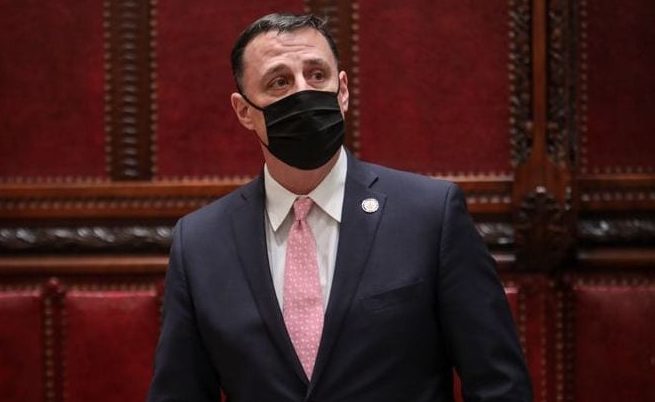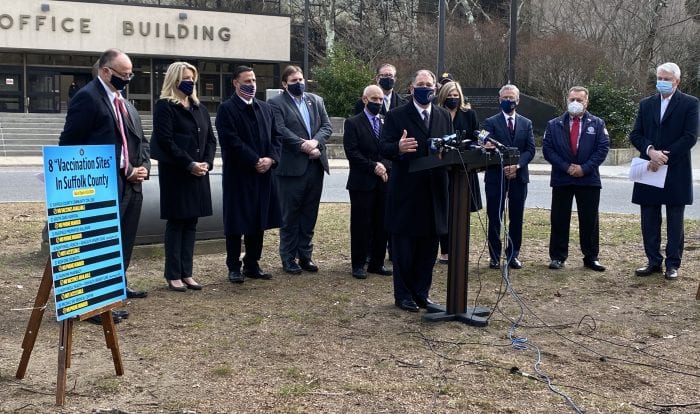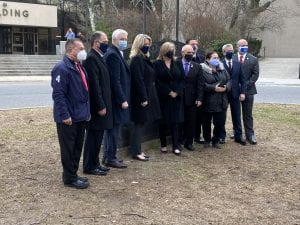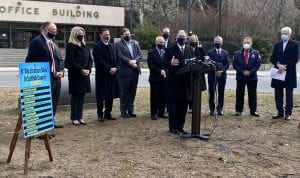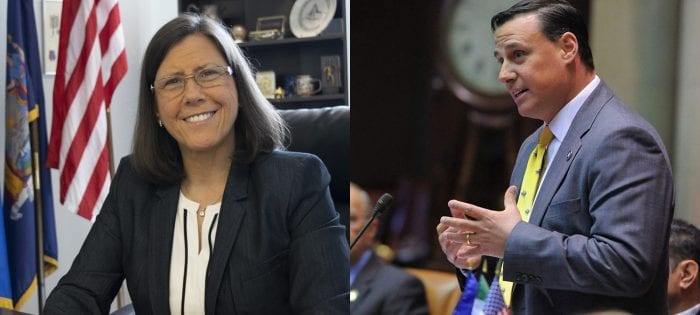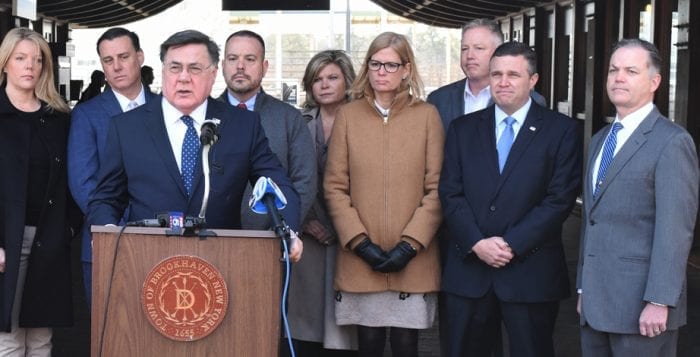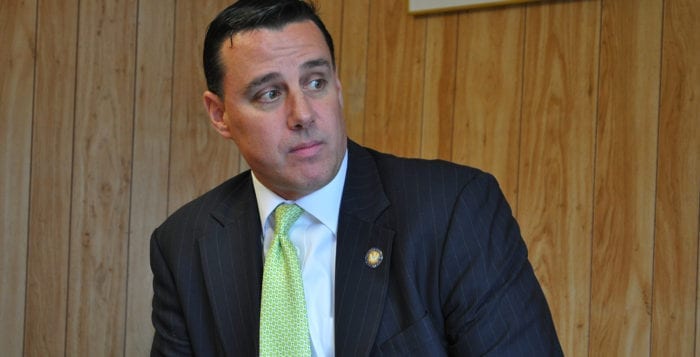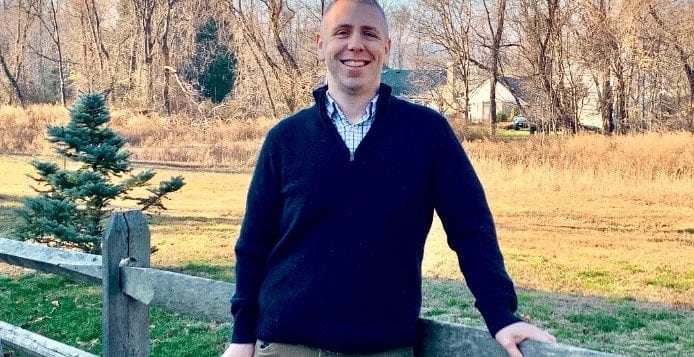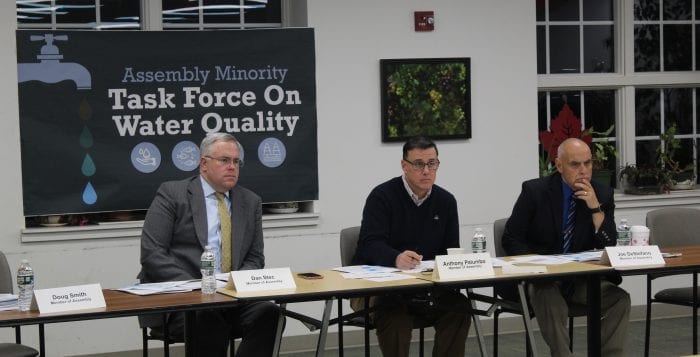It’s been a long time since state Sen. Ken LaValle (R-Port Jefferson) announced his retirement from the state Legislature in January, and so much has changed. Still, both candidates said in an online debate they would live up to LaValle’s 44-year legacy, as well as take the state to task over deaths in nursing homes.
New York State Assemblyman Anthony Palumbo (R-New Suffolk) is campaigning based on his political experience with seven years in the Legislature and his past time working as an assistant district attorney for the Suffolk DA’s Office. He said with his history of helping get 22 bills signed into law, including his work on extending the Pine Barrens and establishing the community preservation fund, “my record speaks for itself.”
Laura Ahearn, a Democrat from Port Jefferson, is running for the seat based on her years both as an attorney who represents adults who were sexually victimized as children, but also as her over-25-year stint as the executive director of the Crimes Victim Center (dba Parents for Megan’s Law), which aids victims of crime, especially women and children. She said her experience working with people on the ground to work on subjects like domestic violence makes her a good fit for the office.
“I’m a fighter, and I’m very independent,” she said.
COVID Response
Both candidates argued the state needs to investigate the number of deaths involving nursing homes, though Ahearn disagreed somewhat on how the pandemic has been handled, especially with reopening.
She said New York needs to keep following the science for keeping the number of infections down. She said, so far, Gov. Andrew Cuomo (D) has done a good job following the science and ensuring they close when they need to close. At the same time, she disagreed with the state allowing big box stores to remain open when smaller businesses that carry the same product were kept closed.
She argued the state needs to start a so-called COVID pandemic unit to identify what went wrong with nursing homes, both in terms of state mandates and of the nursing home directors themselves.
Palumbo said it’s been long enough, and the Legislature should look to wrestle away unilateral power from the governor, something the congressional body gave Cuomo early in the pandemic.
“He said the curve needed to be flattened, and it’s been flattened,” he said. “The governor did a good job in the beginning, but I don’t believe he’s continuing to do so.”
With infection numbers on Long Island low, though some statistics have increased in the city, he said some businesses have been “dying on the vine.” He said the governor performed reopening too slowly, and that it was not fair to some small businesses while larger chains were allowed to open and stay open for a much longer time.
He said nursing homes were directed and compelled to take hospital patients into their facilities, and that there should be a state and federal investigation into the issue.
Small Businesses and Federal Aid
Ahearn argued the federal government has been dragging its feet and has not worked in the best interests of the people by not giving any new federal assistance to states and local municipalities, but Palumbo said New York needs to focus less on federal aid packages and should reopen more broadly to make its economy stronger.
Ahearn also noted that the Paycheck Protection Program, which gave loans to small businesses, had been abused by large national corporations and companies. She said there needs to be some kind of restriction, otherwise there might be more situations like the Miller Place Inn, which was cited earlier this month for a so-called superspreader event.
“What we need to do is get that federal money and help small businesses,” she said. “Let’s keep in mind, when you have a large group of people together, that potential for that to become a hotspot, and then completely raise the infection rate, and we’re all exposed to the potential of people dying again. … There are different ways for us to work with businesses.”
On the topic of a vaccine, Palumbo suggested it could be many months before we have a widespread available treatment. And even if Congress passes a new aid package, that money could be gone in six months.
“The only way to get back on our feet is to allow us to do it smartly,” the assemblyman said. “People with comorbidities and issues need to protect themselves, but we need to provide the tools to do it smartly to our businesses. We can’t just sit back and allow money bombs to come to our state.”
Environment
As LaValle was long known as a steward of the local environment, both candidates argued for more protections of our waterways and groundwater from nitrogen and other chemicals.
Palumbo said in his tenure he has supported the Clean Water Act as well as funding of the Environmental Protection Fund. Along with other state congressmen he helped extend the Community Preservation Act out to 2050.
“These are all significant for the area because you can’t sewer the East End,” he said.
The assemblyman said he has supported innovative septic systems and has cosponsored to help give residents subsidies to purchase those systems. He also argued that PFOA and PFOS chemicals, along with 1,4-dioxane, are substances he advocated the state should ban. Though he said it needs to be a balance between the needs of the farm industry and the environment.
Ahearn said our sole-source aquifer is being contaminated with nitrogen and other chemicals from spills, pesticides and fertilizers.
She called wastewater treatment Long Island’s greatest challenge and said the way nitrogen is leaking from outdated septic systems and cesspools needs to be addressed. She praised Suffolk County’s new bill mandating new construction use denitrifying septic systems.
She said Suffolk only got 10 New York State Septic System Replacement Fund Program grants out of a total of 15 but argued for more of the money lingering in that program be put toward the county. She argued there is a need to steer state such moneys locally.
“There’s a lot more money available on a statewide basis,” she said.
Police Reform
The 1st Senate District candidates argued back and forth on the issue of police reform, with both candidates arguing they are in support of police.
Though Palumbo said he supported some of the state’s police reform bills, including a ban on chokeholds, he was against such things as the repeal of section 50-a, which now allows people access to complaints of police misconduct. The assemblyman argued the repeal also affects firefighters, and that many of those complaints are not necessarily substantiated. He said the state should have looked to set up an independent commission to maybe look into these claims.
“Is it a systemic change when we paint everyone with a broad brush and don’t even include law enforcement in the discussion?” he said. “To say it’s all racist and we have to make these sweeping changes ourselves, is not accurate.”
Ahearn said she has worked alongside local, state and federal law enforcement, though we have to remember the image of George Floyd’s death in Minnesota at the hands of police that sparked widespread protests across the nation. She argued she supported the ban on chokeholds, alongside the need to increase penalties for assault on law enforcement, as well as penalties on people who make false calls to 911. She said she does not support the release of unsubstantiated complaints on police officers, adding there needs to be a way of identifying a pattern of wrongdoing or abuse.
“We absolutely have to work together to get sustained and meaningful changes in policies and laws that lead to the deconstruction of structural and systemic racism in our health care system, education system, housing and in our justice system,” she said. “I don’t like the idea of sweeping legislation all at once without having a discussion about it.”
On the topic of the bail reform law, Ahearn said reform was needed because of the “economic disparities in the justice system that led to individuals who were poor and minorities lingering in jail while their families fell apart.”
At the same time, the problem with the bill was lawmakers did not sit down with stakeholders like crime victim advocates, law enforcement or prosecutors. She said there were immediate problems with the bill and more changes are needed to allow discretion of a judge to set cash bail.
Palumbo, a former prosecutor, said he has been against the bail reform bill since day one, especially because of it allowing people to walk who committed certain crimes most would consider violent. Yet “they still haven’t gone nearly far enough.”
He said he has argued that judicial discretion is needed in setting bail.
“It’s socioeconomic, it’s not a system of racism — it’s poor people who can’t afford to pay that money,” he said.
LaValle’s Legacy
Whatever one may think of Ken LaValle, losing over four decades of seniority in the state Senate will be a big blow for representing Long Island’s largest Senate district. Both candidates said they have plans to make their voice heard in the 63-member body.
Palumbo, who bragged about his endorsement by LaValle, said he would continue that line of “1st District first” with his tenure, saying he would be a force beyond the fact that he could still be in the minority Senate party. He added that many Democrats are representing New York City ideals, and that as a Long Island Republicans, he has different values from those upstate or even in the White House.
“It’s not about the party and the machine,” he said. “We have six Long Island Democrats who all voted for New York City ideals. … I think certainly we can bring bipartisanship and vigorous advocacy for the district.”
Ahearn said some of LaValle’s efforts, such as protections of the Pine Barrens and a burn unit at Stony Brook University Hospital, need to be continued. She said she has had across-the-aisle relationships with people and former state Sen. John Flanagan, a Republican. With longtime relationships with multiple state elected officials, she said she can get the ball rolling immediately upon taking up the seat, especially on things like electrification of the Port Jefferson line of the Long Island Rail Road.
She added that being in the majority has its definite perks, saying that once Republicans lost control of the Senate, LaValle and others found their initiatives floundering.
“Once elected, I would be in the majority, and being in the majority means that legislation you carry and resources you can bring back to this district directly,” she said. “Once you lose that position in majority it’s nearly impossible to move legislation.”


